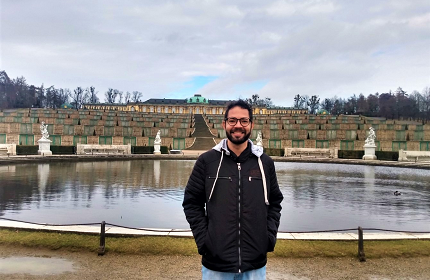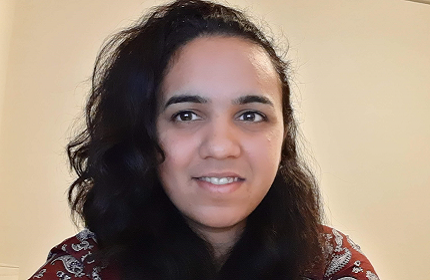Forscher*innen 2021
Glaúber Pontes Rodrigues
Age: 28 years | Nationality: Brazilian | Field of study / work: Hydrology (PhD student at Institut für Umweltwissenschaften und Geographie)
My favorite place in Potsdam/ Berlin / surroundings:
That was hard because I cannot choose one place in Potsdam (and I am glad I saw everything with and without snow): Park Babelsberg, Park Sanssouci, the Neues Palais campus (which is in my way from home to the Golm campus), Alter Markt, the bridge over the Havel near the Filmmuseum…
The most surprising thing about Germany?
Several things surprised me. The first was the friendliness of the German people and the effort to help. The cliché of the severe and rigid German no longer makes sense and has fallen apart since the first moment in the Airport. So far everyone has been genuinely nice to help me catch a train, for example, or to give me information. However, in the supermarket, things change a bit… In Brazil, I considered myself someone who packs my own purchases fast, but the Germans do this as if they were already taught since childhood! It is not uncommon to go to the market and receive looks disapproving my packaging speed. Also, the prices of things surprised me positively, the basic items are really cheap (and so is the beer).
My advice for fellow scholars:
Try to talk about your research subject with your colleagues and even with people from outside your work environment. Some excellent contributions to your research can come from everywhere. Also, don’t feel intimidated by the language (but don't underestimate it). Surround yourself with German, listening, reading, speaking... German grammar can give you a headache, but over time things start to flow. Try to organize weekly schedules, daily goals, for example, always keeping in mind that it is not easy at all and trying to learn everything fast can create traumas and blockages.
My future plans:
My internship in Potsdam only lasts one year, so I must return to Brazil to develop my last year of the PhD and defend my Thesis. I hope to find a much better place than the one I said goodbye in January and share the knowledge acquired in this short period in Potsdam. In the short term I intend to improve my programming skills (for my research and because it is something very well seen here in Germany). In the medium term, I intend to write a relevant article about my research (which covers evaporation in reservoirs in the Brazilian semiarid and climate change scenarios). In the long term I plan to return to Germany, as a post doc, who knows... Returning or not, I expect to contribute to the development of my region with better understanding of the hydrological processes in the Brazilian semiarid region.
Where were you during the first months of the pandemic?
I was in my city (Fortaleza, northeast of Brazil), where the first Covid cases arose in March 2020.
How did the lockdown affect your (professional) life?
At the beginning of the restrictive measures, I was conducting my experiment in a lake located in the neighbouring city. It was hard because the restrictive measures made travel less and less frequent and we had to remove the experiment from the lake. Luckily, we collected enough data, and I came to Germany with that already recorded. So, from now on I don't need to go to the field anymore, a laptop with the programs I need and an internet connection are enough.
Was there also a positive outcome for you during these months?
As I could no longer attend the university restaurant at the Brazilian university and spend all day at home, I developed skills in the kitchen; in Germany I realized that I could manage with (almost) any culinary ingredient. In addition, in Potsdam I am riding more bicycle than I have ever been in my life, and this is great even for mental health.
Is there anything you are appreciating more now?
I am enjoying more time alone. It is difficult, but necessary, mainly because PhD research is somewhat solitary. I am able to entertain myself (and speaking English and German out loud alone, I recommend it to anyone who is learning languages).

„We live in times of denial of scientifically based facts (anti-vaccine and anti-mask protests erupt around the world). It is necessary for us researches to make a self-assessment and think about alternatives to disseminate scientific knowledge in a more accessible way to the population. It is not enough to take information, but to know how to transmit, because so much information we receive daily, many think they are “specialists in everything”. Research is not an easy task, it can be frustrating many times, but we must seek strength in these adversities. In addition, we must be in solidarity with those who do not have the opportunity to be in privileged places that we are now (as an internationally known University, for instance) and without access to basic dignity at a time when the pandemic showed that the gap between the wealthiest and the poorest only increases.“
Mitali Damle
Age: 29 years | Nationality: Indian | Field of study / work: (2nd year) PhD student in Astrophysics
Where were you during the first months of the pandemic?
I had just returned from a trip from my home country, India, when the news of a possible lockdown started surfacing here in Germany. During the initial couple of months of lockdown, I was holed up in my apartment in Potsdam and was entirely working in home office.
How did the lockdown affect your (professional) life?
Though, thankfully, the pandemic did not directly affect me or my near ones, overall, it certainly had a significant impact on my professional life. Firstly, coming to grips with this sort of a situation and the accompanying unique restrictions took some substantial amount of time for me. Luckily, my field and topic does not require any specific work setup; a laptop and a good internet connection is all I need to get on with my work. However, the nature of a PhD usually means working individually most of the time and therefore, chatting with your work/group colleagues over a coffee break or lunch fulfils a much-needed requirement for social interaction. With COVID-19, all of these were replaced by much less frequent Zoom meetups, which, though a good alternative cannot completely mimic real face-to-face conversational setups. Lots of conferences were cancelled, a ton of others were postponed and consequently held online. For an early-stage PhD student, conferences are not just an important way to get to know the work of peers and experts of the field and interact with them but to also present your own work to the community. Nonetheless, the coming year is likely to have quite a few of them in online format which would certainly compensate for the lack of networking for a lot of PhD students like me.
Is there anything you are appreciating more now?
Reading daily news about the strenuous job of healthcare workers across the world, people who had jobs that required them to travel even in such circumstances, many others who had lost their jobs and so many more who had lost their near-dear ones to this virus has made me appreciate the fact that I have a stable, well-paying job and that my family is safe as well.
Do you have any idea or suggestion for our community/what we could do in this time?
Well next time we have to find out how to help the weakest students. We lose them more or less right way.
Maybe it could be possible to differentiate so those seminars with few students could be in real life at university and we still could keep up all Corona conditions.

„Certainly! Just like every dark cloud is laced by a silver lining, there have been quite some positives for me. Working from home meant I saved commute time and in general, had more time which was available for other things. With the gyms and other sporting facilities being shut, going outdoors for a daily run became a routine for me. In the process, I was able to discover quite many hidden, beautiful spots in my neighborhood (which I, otherwise, might have not had the chance to explore). I also started sketching again, started reading books more regularly and experienced a renewed interest in cooking. I guess, over the course of past few months, my mental strength has increased a bit and I now feel less terrified when I think about the uncertainty that accompanies this pandemic.“
